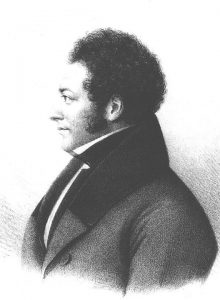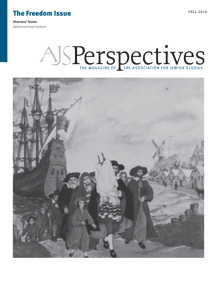![“Hegel am Katheder [Hegel teaching his pupils],” lithograph, 1828 by F. Kluger. Schiller Nationalmuseum Marbach am Neckar; via Wikimedia Commons.](http://perspectives.ajsnet.org/wp-content/uploads/rose_1.jpg)
When Gans wrote the preface to his edition of Hegel's Philosophy of Right he was a member of the law faculty at the University of Berlin, where Hegel had held the chair in philosophy from 1818 until his death. Though Gans was a brilliant legal historian, his appointment as university faculty—an official state post—was anything but straightforward. Gans received it, in fact, only after undergoing a pro forma conversion from Judaism to Christianity in 1825. Gans's conversion spelled the definitive end to the Verein für Cultur und Wissenschaft der Juden (Association for the Culture and Science of the Jews), of which Gans had been the visionary president. While at the helm of the Verein during the early 1820s, Gans defiantly pressed the Prussian government to appoint him—as a Jew—to the University of Berlin law faculty. At stake in these heady years was what sort of state Prussia of the post-Napoleonic era would be. Hegel and his followers—among whom Gans and most of the other active Verein members could be counted, including Ludwig Marcus, Moses Moser, and Immanuel Wolf—wanted to help shape the Prussian state according to the principles of rationality and freedom as they understood them.
The Verein, which formed in 1819, eventually devoted much of its energies to a new form of secular academic Jewish scholarship; in fact, it was the Verein that came up with the name that would remain the chief term for the vibrant field of German Jewish scholarship from the early nineteenth century until the Holocaust: Wissenschaft des Judentums. For this reason, the Verein has become enshrined as one origin of academic Jewish Studies. Yet while this emplotment of the Verein in narratives of Jewish Studies' disciplinary origins is partly justified, it obscures the decidedly political aspirations of the Verein's project.

Hegel was indeed a relentless critic of what he took to be assertions of abstract subjectivity, and one of the key threats he saw to the higher rational freedom of the state came in the form of religious groups that privileged irrational faith over universal reason. Hegel saw in such groups a recalcitrant subjectivity asserting pseudofreedom against the rationality that, for him, was the true essence of free human spirit and ethical community. In various writings and lectures, Hegel therefore proposed what he called a philosophy or science of religion—Wissenschaft der Religion—as a rational corrective to the corrosive irrationalism of overly "subjective" religious groups. Such a science or Wissenschaft of religion would lay bare the rational core in religious ideas so that religiosity could serve as a foundation of, rather than a threat to, the higher substantive rationality of the state. Gans almost certainly had this political function of a Hegelian Wissenschaft der Religion in mind when he coined the term Wissenschaft des Judentums.
The paramount role Hegel assigned to intellection and wissenschaftlich discourse in the completion of human freedom in the state proved intoxicating to the Verein members, nearly all first-generation university students. If wissenschaftlich prowess was above all what was required to integrate the Jewish community into the state, they were the perfect candidates for the job. Moreover, much else about Hegel made him an attractive ally. Jewish Studies scholars reaching back at least to the great nineteenthcentury Jewish historian Heinrich Graetz have tended to look upon Hegel as bad for the Jews, and there is some justification for this view. In youthful theological writings from the 1790s (posthumously published and unknown to the Verein), Hegel traded in negative stereotypes of Jews as egoistic and misanthropic. And although Hegel's appraisal of the Jewish contribution to world history became significantly more positive in his mature work, it was arguably never generous. Nonetheless, within the intellectual and political landscape of 1820s Prussia, Hegel was very much a progressive. He advocated for a state based on principles of universal rationality and constitutionalism; spoke out against antisemitism and völkisch conceptions of the polity; and took on the romantic nationalism of his academic rivals in the "historical school" of law— some of the people most opposed to Gans's academic appointment. Moreover, in The Philosophy of Right Hegel stated that civil service posts should be open to talented men of any background, expressly including Jews. Given the enormous respect Hegel expressed for civil servants, whom he viewed as a "universal class" of the highest ethical character, selflessly devoted to the universal good, it is not surprising that the Verein members enthusiastically came to think of themselves as Jewish quasi state bureaucrats whose task it was to mediate between the Jewish community and the greater ethical community of "the state." The Verein members' self-understanding as Hegelian bureaucrats can be seen in the inordinate energy they invested, over the first eighteen months of the association's existence, in drafting and refining the organization's intricate formal statutes, which they submitted (unsuccessfully) for government approval. Such emphasis on the formal conceptual architecture and bureaucratic trappings of the association had everything to do with a wish to make it appear as a ponderous quasi-state agency, and had precious little to do with—indeed, diverted energy from—the rather more modest task of producing academic scholarship. (It is surely no accident that the two most productive and influential practitioners, rather than theoreticians, among the Verein members of the new discipline of Jewish Studies, Leopold Zunz and Isaak Markus Jost, were also the least enamored of Hegel. Jost even quit the Verein in disgust over what he deemed its risible selfimportance.)
A potent mixture of naïveté, hubris, and Hegelian theory allowed the Verein intellectuals to fashion themselves as citizens of Hegel's state and indeed even as civil servants in that state's service, even though they remained at a far remove from any real position of power. Neither the reactionaries consolidating power in Restoration Prussia nor the Berlin Jewish community had much use for the intricacies of Hegelian political theory. Fittingly, the law, issued in August 1822, definitively barring Jews from service in the "German-Christian" Prussian state, after this question had been left ambiguous by the Edict of Emancipation promulgated in 1812, during the short-lived era of progressive Prussian reform, is to this day referred to as the "Lex Gans." Yet ultimately the problem was not that the young intellectuals of the Verein found it impossible to integrate themselves and the Jewish community as they theorized it into Hegel's state understood as, in Gans's later phrase, "the life of freedom in its entirety." Rather, the problem was that it was only into Hegel's state that they could find entrance. Opportunities for achieving freedom as Jews in the actually existing Prussian state proved bleaker.

